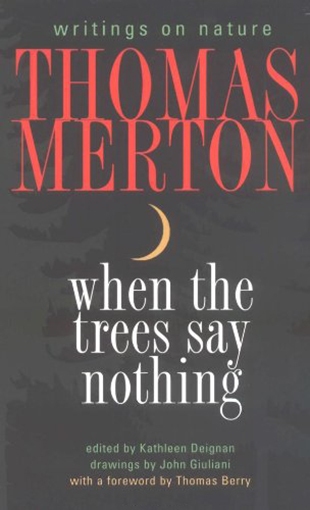This pleasing and meditative work edited by Kathleen Deignan, professor of religious studies at Iona College in New Rochelle, New York, contains over 300 writings from Thomas Merton (1915 - 1968) on the natural world. There are chapters on the four seasons; the elements; the firmament; creatures; rain, flowers and trees; mountains; forest; and Sophia. These pieces are delightfully enriched by the drawings of John B. Giuliani.
In her introduction, the editor notes that Merton's attitudes toward nature grew out of his Catholic sacramentalism, the Celtic spirit in his Welsh blood, his appreciation for Zen simplicity, his respect for the Franciscan tradition, and the pleasure he drew from engaging with the good Earth as farmer and forester at the monastery. She concludes: "Perhaps Merton's writings on nature will awaken the naturalist in us, or the poet, or the creation mystic. Perhaps he will aid us in recovering our sense that were fashioned to behold the wonders all around us." Those hopes have certainly come to fruition in us. After reading this little volume, we felt greater gratitude for the marvels and surprises of the creation.
For starters, there is this: "How necessary it is for monks to work in the fields, in the sun, in the mud, in the clay, in the wind: these are our spiritual directors and our novice-masters. They form our contemplation. They instill us with virtue. They make us stable as the land we live in." Merton repeatedly opens himself to receive the ample teachings of trees, forests, and other representatives of the natural world. He calls a "great, gashed, half-naked mountain" one of God's saints. He spends an afternoon in the forest with a 15-year-old boy who is fascinated with lizards, birds, and other creatures and calls it the equivalent of prayer. And after looking with reverence on a field of corn, Merton writes: "I know the joy and the worship the Indians must have felt, and the Eucharistic rightness of it! How can one not feel such things — so that I love the Mayas and the Incas as perhaps the most human of peoples, as the ones who did most honor to our continents."
Near the end of this soul-satisfying collection, the author states: "It is essential to experience all the times and moods of this place." Be engaged with nature, he urges. Feel your connection to the creation. Merton's example on these pages is truly an inspiration.
